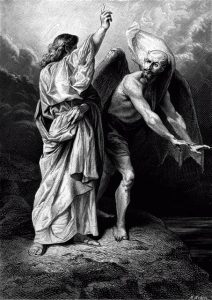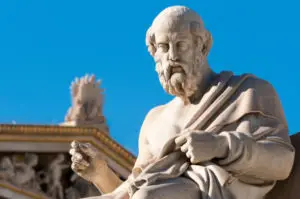One of the most often quoted passages in support of Jesus’ deity is also one of the most contested. Trinitarians and non-Trinitarians alike each assert that it supports their own Christological view:
Philippians 2:5-11 (NASB) Have this attitude in yourselves which was also in Christ Jesus, 6 who, although He existed in the form of God, did not regard equality with God a thing to be grasped, 7 but emptied Himself, taking the form of a bond-servant, and being made in the likeness of men. 8 Being found in appearance as a man, He humbled Himself by becoming obedient to the point of death, even death on a cross. 9 For this reason also, God highly exalted Him, and bestowed on Him the name which is above every name, 10 so that at the name of Jesus EVERY KNEE WILL BOW, of those who are in heaven and on earth and under the earth, 11 and that every tongue will confess that Jesus Christ is Lord, to the glory of God the Father.
What was Paul trying to communicate to his readers? What would they have understood his words to mean? Virtually all Christians agree that Paul’s main point here is that Christians should humble themselves and serve others just as Jesus did. The point of contention arises when we ask the question: From what position did Jesus humble himself? From that of God or God’s Messiah? In this post, we’ll  examine key elements of what has been called the Carmen Christi or the Christ-hymn of Philippians in order to determine its meaning.
examine key elements of what has been called the Carmen Christi or the Christ-hymn of Philippians in order to determine its meaning.
Form of God, Form of a Bond-Servant
Trinitarians interpret the phrase he existed in the form of God in verse 6 as a reference to Jesus’ pre-existence in heaven as God. And the phrase emptied himself, taking the form of a bond-servant in verse 7 as a reference to his incarnation. The key to a proper interpretation of these phrases is to determine what the word form means since Jesus is said to have both the form of God and the form of a bond-servant.
The word form in Greek is morphê, and it means form or shape. Trinitarians contend that its usage here refers to Jesus’ inner divine nature. For them, the phrase serves as proof that he is God. The NIV translators were, in fact, so confident of this interpretation that they translated the phrase to read, “being in very nature God.” Vine’s Expository Dictionary appears to agree. It says that morphê “includes the whole nature and essence of Deity.”[1] However, there are many other notable, scholarly works that refute this meaning. For example, Dr. Jason BeDuhn, author and professor of religious studies, found that those who translate morphê to mean nature or essence:
do not translate the Greek, but substitute interpretations of their own that are not based in Paul’s language at all. Therefore they are inaccurate; and their bias is evident in what they try to import into the passage. [They] have tried to introduce a “two-nature” Christology (first worked out by Christians at the Council of Chalcedon over three hundred years after the New Testament was written)… We do not gain much confidence in their interpretation of the passage when we see how they tamper with the text to support it.[2]
Moreover, Joseph Thayer, in his well-respected Greek lexicon, says that morphê is “the form by which a person or thing strikes the vision; the external appearance.” By way of example, Thayer points out that the Greeks used morphê to say that children reflect the appearance of their parents. Furthermore, Thayer specifies that some scholars try to make morphê refer to that which is “intrinsic and essential,” in contrast to that which is outward, but says, that “the distinction is rejected by many.”[3]
In addition to Thayer, Walter Bauer’s scholarly lexicon defines morphê as “form, outward appearance, shape.”[4] What’s more, The Theological Dictionary of the New Testament records morphê as “form, external appearance.”[5]
What then does it mean to have the outward appearance or form (morphê) of God? Ralph Martin, in his commentary on Philippians, says that the reference to Christ being “in the form of God” has been acknowledged by various authors as synonymous with being “in the image of God.“[6] Indeed, Paul wrote to the church in Corinth that Jesus is “the image of God,” and to the church in Colossae that he is the “image of the invisible God.”[7] If Paul had wanted to tell his readers–whether in Philippi, Corinth or Colossae–that Jesus is God he could have plainly said so. However, this is not what Paul was trying to convey because it’s not what he believed. Paul said that the Father is the one true God, while Jesus is the Christ (Messiah):
1 Corinthians 8:6 (NASB) yet for us there is but one God, the Father, from whom are all things and we exist for Him; and one Lord, Jesus Christ, by whom are all things, and we exist through Him.
Paul was conveying what the rest of the New Testament conveys, that Jesus is the exact representation of God.[8] As the Christ, Jesus was God’s agent in the earth. He fully imaged or reflected God by doing only the will of God. He further imaged God by speaking only the Father’s words, and by attributing the miracles he performed to God working through him. [9] It’s no wonder Jesus said, “He who has seen me, has seen the Father.” [10] Jesus’ choice to obediently image God is in stark contrast to  that of Adam who, although he also bore the image of God, failed in his role to represent Him in the earth.[11] Many scholars see Philippians 2 as a comparison between the first Adam and Jesus, whom Paul calls “the last Adam.”[12] Known as Adam Christology, Paul paints Jesus’ obedience against the backdrop of Adam’s disobedience. [13]
that of Adam who, although he also bore the image of God, failed in his role to represent Him in the earth.[11] Many scholars see Philippians 2 as a comparison between the first Adam and Jesus, whom Paul calls “the last Adam.”[12] Known as Adam Christology, Paul paints Jesus’ obedience against the backdrop of Adam’s disobedience. [13]
Another way to determine what it means for Jesus to be in the form of God is to look at the only other New Testament usage of the word morphê. Mark records in his gospel an encounter that took place between two men and the glorified Jesus as they walked on the road to Emmaus:[14]
Mark 16:12 (NASB) After that, He appeared in a different form to two of them while they were walking along on their way to the country.
The word form here is morphê. Surely, one would agree that it refers to Jesus’ outer form, that is, his appearance and not his inner nature. For one thing, one’s inner nature cannot be seen, and for another, not even Trinitarians would argue that the resurrected Jesus changed his nature or essence. On the contrary, we naturally understand morphê to be a synonym for Jesus’ external image or appearance. Thus, modern scholarship, Paul’s theology, and usage of the word morphê all help us understand that being in the form of God is not a declaration of Christ’s deity.
Did not regard equality with God a thing to be grasped
If “being in the form of God” fails as proof for the deity of Christ, some will argue that the phrase, “equality with God” is sufficient evidence to prove he is God:
Philippians 2:5-6 (NASB) Have this attitude in yourselves which was also in Christ Jesus, 6 who, although He existed in the form of God, did not regard equality with God a thing to be grasped,
Scholars across the board agree that the phrase to be grasped can be difficult to decipher. However, the basic consensus is that there are two possible meanings. First, that Jesus did not possess equality with God and, unlike Adam, who grasped at being like God,[15] chose not to exalt himself. The other possible meaning is that Jesus possessed equality with God but chose not to grasp or cling to it. In other words, he chose not to hold onto or exercise the rights and privileges associated with his equality. Both possible interpretations have sound arguments to support them, and both can be satisfactorily interpreted without fitting Jesus into a Trinitarian mold. Nevertheless, for the purposes of this post, we will take the position that Jesus is equal with God but chose not to exploit his rights.
What then does it mean to have equality with God? If Jesus is God, Paul could have simply said so. Instead, he wrote that Jesus is equal with God. But in what sense? This question can best be answered from a Jewish perspective which Paul, being Jewish, would have employed. A common practice among Jews in antiquity is what is known as the principle of agency. Although well known in academic circles, it is relatively unknown among the laity. Professor and New Testament scholar, James McGrath, explains the principle and its vital role in Hebraic culture:
Agency was an important part of every day life in the ancient world. Individuals such as prophets and angels mentioned in the Jewish Scriptures were thought of as ‘agents’ of God. And the key idea regarding agency in the ancient world appears to be summarized in the phrase from rabbinic literature so often quoted in these contexts: “The one sent is like the one who sent him.” [16] (emphasis added)
Moreover, Biblical scholar, Marianne Meye Thompson, writes that one’s agent was seen as the legal equivalent to the person who sent him:
In the rabbinic writings there is reference to the figure of the saliah [shaliah], which literally means “one who is sent”… A saliah was a surrogate sent on a task or a mission with specific instructions and authority to carry it out…A common saying in the rabbis was “the one who is sent is like the one who sent him” or “a man’s agent is equivalent to himself. Because the saliah may act on behalf of the one who sent him, when one deals with the saliah it is as if one is dealing with the one who sent that person.[17] (emphasis added)
Indeed, this common principle sheds light on the meaning of Jesus’ equality with God. Jesus of Nazareth was anointed by God to be the Messiah who would rule on God’s behalf.[18] Thus, according to the principle of agency, he was functionally equal with God. We see a Christological foreshadowing of this in the life of Joseph, son of Jacob. As a youth, Joseph was sold into slavery by his brothers. Through divine providence, however, Joseph rose to prominence in the court of the pharaoh of Egypt:

Genesis 41:40-44 (NASB) “You [Joseph] shall be over my house, and according to your command all my people shall do homage; only in the throne I will be greater than you.” 41 Pharaoh said to Joseph, “See, I have set you over all the land of Egypt.” 42 Then Pharaoh took off his signet ring from his hand and put it on Joseph’s hand, and clothed him in garments of fine linen and put the gold necklace around his neck. 43 He had him ride in his second chariot; and they proclaimed before him, “Bow the knee!” And he set him over all the land of Egypt. 44 Moreover, Pharaoh said to Joseph, “Though I am Pharaoh, yet without your permission no one shall raise his hand or foot in all the land of Egypt.” (emphasis added)
Pharaoh promoted Joseph to second in command over all of Egypt. The former Hebrew slave was to be the king’s agent, representing him in all the affairs of that great land. As such, Joseph was given authority and all the rights and privileges associated with his rank. Even Joseph’s brothers understood that he was Pharaoh’s equal:
Genesis 44:18 (NASB) Then Judah approached him, and said, “Oh my lord, may your servant please speak a word in my lord’s ears, and do not be angry with your servant; for you are equal to Pharaoh. (emphasis added)
In like manner, Jesus’ equality with God was not a matter of being of the same nature or essence as God, but of being God’s agent and therefore, his functional equal. In his commentary on Philippians, Pat Harrell, professor of Biblical Studies, explains Christ’s equality with God this way:
Or, to state it differently, the stress in this passage is on the Lord’s rank rather than his essence...The meaning of the statement [equality with God a thing to be grasped] is that Christ turned his back on the “rank” of equality with God, refusing to exert himself for what was his by right, choosing rather the way of obedience.[19] (emphasis added)
Just as Joseph was given certain privileges as Pharaoh’s viceroy, Jesus possessed certain rights and privileges associated with his appointment as God’s Messiah. Paul’s point in Philippians is that Christ humbled himself and did not take advantage of his rank. For example, on the night he was betrayed, Jesus washed the feet of his disciples, even Judas’. A task that was typically done by a lowly servant, nevertheless, the future king humbled himself and performed it.[20] Additionally, when Jesus was arrested in the Garden of Gethsemane, he could have appealed to his Father to give him command of 72,000 angels:[21]
Matthew 26:52-53 (NASB) Then Jesus *said to him, “Put your sword back into its place; for all those who take up the sword shall perish by the sword. 53 “Or do you think that I cannot appeal to My Father, and He will at once put at My disposal more than twelve legions of angels?
Instead of availing himself of this right, Jesus surrendered to a much lesser authority in order that “the Scriptures might be fulfilled.” Of course, the greatest example, and one that we’ll see Paul address, is Jesus’ willingness to die for the sins of the world though he himself was innocent.
Jesus emptied himself and took the form of a bond servant
Trinitarians attempt to use the following verse to prove Jesus was incarnated, and thus pre-existed in heaven as God:
Philippians 2:6-7 (NASB) who, although He existed in the form of God, did not regard equality with God a thing to be grasped, 7 but emptied Himself, taking the form of a bond-servant, and being made in the likeness of men.
 The word emptied in Greek is kenoô, and it means to make empty, void, of no effect, to nullify, render vain, useless.[22] Whatever being in the form of God means, the text explains that Jesus emptied Himself of it in order to become a bond-servant. If, according to Trinitarians, being in the form of God refers to Jesus’ divine nature, then it follows that he had to empty himself of this nature in some sense in order to take on the form of a bond servant. Trinitarians are divided as to just how Jesus could have emptied himself of his divine nature, or possibly set aside his divine attributes, and yet still be God. As one Trinitarian minister explains, it’s an impossibility:
The word emptied in Greek is kenoô, and it means to make empty, void, of no effect, to nullify, render vain, useless.[22] Whatever being in the form of God means, the text explains that Jesus emptied Himself of it in order to become a bond-servant. If, according to Trinitarians, being in the form of God refers to Jesus’ divine nature, then it follows that he had to empty himself of this nature in some sense in order to take on the form of a bond servant. Trinitarians are divided as to just how Jesus could have emptied himself of his divine nature, or possibly set aside his divine attributes, and yet still be God. As one Trinitarian minister explains, it’s an impossibility:
Jesus did not give up any of his divine attributes at the incarnation. He remained in full possession of all of them. For if he were to ever give up any of his divine attributes, he would cease being God.[23]
Theories abound as to how to rectify the many problems that arise from the notion that Jesus, in some way, emptied himself of something akin to his divine nature or attributes. Instead of clarifying the Pauline text, this theory adds to the confusion. What brings clarity to the text, however, is the position that Jesus emptied himself of the rights and privileges associated with being the agent of God and the future king. Instead of ruling over others and insisting that he be treated as his station deserved, he chose to humble himself and accept subjugation as a bond-servant, being made in the likeness of men. Author and church historian, Kegan Chandler, explains what being made in the likeness of men means:
…Jesus’ “being made in the likeness of men” (v. 7) is not a retelling of an Incarnation story, but a reference to his divesting himself of his Adamic rulership as Messiah and living in submission “as every other man does.”[24]
How far was Jesus willing to go in order to appear like every other man? To what extent was he willing to obey his God?
Philippians 2:8 (NASB) Being found in appearance as a man, He humbled Himself by becoming obedient to the point of death, even death on a cross.
The word appearance in the Greek is schêma, and it means figure or shape, and can be translated as appearance or form. The words morphê (form) and schema (appearance) are often interchangeable.[25] Even though Jesus was God’s agent, and anointed to serve as king under the Most High,[26] he was willing to appear as a sinful man (though he was without sin[27]) and be crucified as a common criminal. But, as you know, that’s not the end of the story. What comes next is truly astounding:
Philippians 2:9-11 (NASB) For this reason also, God highly exalted Him, and bestowed on Him the name which is above every name, 10 so that at the name of Jesus EVERY KNEE WILL BOW, of those who are in heaven and on earth and under the earth, 11 and that every tongue will confess that Jesus Christ is Lord, to the glory of God the Father. (emphasis added)
For this reason, God highly exalted him
Why was Jesus exalted and given such unprecedented authority? Was it because he was God and he was simply returning to the heavenly throne he had temporarily vacated? Not according to Isaiah. Chapter 53, famous for its foreshadowing of the suffering and death of God’s Servant (i.e. the Messiah), also foreshadows his exaltation, not because he is God, but because of his obedience unto death:
Isaiah 53:11-12 (NASB) As a result of the anguish of His soul, He will see it and be satisfied; By His knowledge the Righteous One, My Servant, will justify the many, As He will bear their iniquities. 12 Therefore, I will allot Him a portion with the great, And He will divide the booty with the strong; Because He poured out Himself to death, And was numbered with the transgressors; Yet He Himself bore the sin of many, And interceded for the transgressors. (emphasis added)
Paul echoes this truth when he specifically says the reason for Jesus’ exaltation was because of his humility and extreme obedience–death on a cross. When we understand that Jesus gained the kingdom by his obedience to God, it helps us better understand his wilderness temptation:
Matthew 4:8-11 (NASB) 8 Again, the devil *took Him to a very high mountain and *showed Him all the kingdoms of the world and their glory; 9 and he said to Him, “All these things I will give You, if You fall down and worship me.” 10 Then Jesus *said to him, “Go, Satan! For it is written, ‘YOU SHALL WORSHIP THE LORD YOUR GOD, AND SERVE HIM ONLY.'” 11 Then the devil *left Him; and behold, angels came and began to minister to Him.
Satan tempted Jesus to take the path of exaltation that circumvented the crucifixion. But Jesus chose to worship God by obeying Him, even if it meant horrific suffering. Thus, Paul writes for this reason God highly exalted him and gave him the name above every name (authority). Jesus was given the kingdom because he chose to obey God.
What is Paul’s conclusion in all of this? That all of mankind will pay homage to Jesus as the exalted God-Man? Decidedly, no! Rather, that every knee will bow and tongue confess that Jesus is Lord. Peter presented the same message on the Day of Pentecost:
Acts 2:36 (NASB) “Therefore let all the house of Israel know for certain that God has made Him both Lord and Christ—this Jesus whom you crucified.”
Peter simply but powerfully notes that God made Jesus both Lord and Christ. If Jesus was God he would by definition already be Lord. But both Peter and Paul reveal that it was God who made Jesus Lord. James Dunn, professor and New Testament scholar, offers his observations:
To argue that the exaltation or hyper-exaltation of [Philippians] 2:9 was a resumption of the divine mode of existence already enjoyed in 2:6 ignores not only the Adam motif, but also the consistent emphasis that kyrios (lord) was bestowed on Jesus at exaltation.[28]
Moreover, Paul further concludes by saying that Jesus’ exaltation would not be to the glory of the supposed God-Man, but to glory of the one who exalted him, that is, God who is the Father:
Philippians 2:9-11 (NASB) For this reason also, God highly exalted Him, and bestowed on Him the name which is above every name, 10 so that at the name of Jesus EVERY KNEE WILL BOW, of those who are in heaven and on earth and under the earth, 11 and that every tongue will confess that Jesus Christ is Lord, to the glory of God the Father.

Chandler provides us with his insight into Paul’s defining statement:
Ultimately, in Philippians 2, it is because of Jesus’ participation in God’s work that he is awarded his status, not because he bears an inherent divine nature. All honor that is now rightfully paid to Jesus for what he has done also glorifies God the Father (v. 11). We should not miss the fact that the endgame of Jesus’ acknowledgment as “lord” is not the glorification of Jesus as God, but a glorification of the great God who exalted him: “Every tongue [that] acknowledge[s] that Jesus Christ is Lord [does so] to the glory of God the Father” (Phil 2:11).[29]
Dunn also comments on the wonder of what God has done:
On the contrary, it was God who would be glorified in the confession of Jesus, and not because the one was identified with the other (Jesus is Lord, God is the Father). But most obviously, because the one God (of Isaiah 45) had chosen to share his sovereignty with the exalted Christ. In other words, we are back once again in the scenario of 1 Cor. 15:24-28. The universal lordship of Jesus Christ has been determined and affected by God, but the supreme glory is God’s.[30] (emphasis added)
Perhaps the best way to summarize what we have covered in this post is to read Biblical scholar Sir Anthony Buzzard’s, translation of Philippians 2:5-11:
Make sure that your attitude is the same as the one demonstrated by the man Messiah Jesus, who having the status of God as His unique representative, did not consider his position as God’s unique agent as something to be used for his own advantage. Rather he constantly emptied himself by assuming the status of a servant, taking on the likeness of ordinary men. And appearing to be just an ordinary man, he humbled himself by becoming obedient to the point of death–even to death on the cross. For this reason God exalted him to the highest position in the universe and gave him the authority which is above every authority, so that in the name Jesus every knee should bow in reverence–of those who are in heaven and on earth and under the earth. This is so that every tongue should confess that Jesus Messiah is lord to the glory of the One God, who is the Father.[31]
The preponderance of the Biblical evidence is that Jesus is not God, for there is only one God whom Scripture repeatedly and emphatically declares to be the Father.[32] Paul’s purpose in writing was to exhort believers in Philippi to humble themselves and consider others more important, just as Jesus had done.[33] Although Jesus, as the Messiah, was functionally equal with God, he chose to serve God and mankind by taking on sin, that we might become the righteousness of God in Christ Jesus.[34]
[1] W.E. Vine, Vine’s Expository Dictionary of Biblical Words, (Thomas Nelson Publishers, 1985), p. 251.
[2] Jason David BeDuhn, Truth in Translation: Accuracy and Bias in English Versions of the New Testament. (Lanham, University Press of America, 2003), p. 53.
[3] Joseph H. Thayer, Thayer’s Greek-English Lexicon of the New Testament, accessed online at Biblehub.com, (Strong’s #3444, morphê), 9-8-19.
[4] Walter Bauer as quoted by BiblicalUnitarian.com, accessed 9-10-19. https://www.biblicalunitarian.com/verses/philippians-2-6-8
[5] The Theological Dictionary of the New Testament, Gehard Kittel, ed., Abridged in One Volume by Geoffrey W. Bromiley, (Grand Rapids, MI: William Eerdmans Publishing, 1985), p. 607.
[6] Ralph P. Martin, Epistle of Paul to the Philippians: An Introduction and Commentary, Tyndale New Testament Commentaries (Grand Rapids: Eerdmans, 1987), p. 102.
[7] 2 Corinthians 4:4 and Colossians 1:15.
[8] Hebrews 1:3.
[9] John 7:16, 8:28, 14:24; John 5:36; 10:32, 37; 14:10; Acts 2:22, 10:38.
[10] John 14:7-11.
[11] Genesis 1:26-27; 3:1-24.
[12] 1 Corinthians 15:45; Romans 5:14.
[13] See James Dunn, Christology in the Making, p. 115; J. Daniel Kirk, “Mark’s Son of Man and Paul’s Second Adam,” Horizons, p. 192; O’Connor, “Christological Anthropology,” R.B., pp. 37-42. Steenburg, “Adam and Christ as the Image of God,” JNST, pp. 95-109; Martin, Carmen Christi: Philippians 2.5-11, p. 108.
[14] See also Luke 24:16, 31.
[15] Genesis 3:5.
[16] James F. McGrath, The Only True God: Early Christian Monotheism in its Jewish Context, (University of Illinois Press, 2009) p. 14.
[17] Marianne Meye Thompson, “Gospel of John,” in Dictionary of Jesus and the Gospels, Joel B. Green, ed. 1992 (Downers Grove, IL: Intervarsity Press, 1992), p. 377.
[18] Micah 5:2, 4; Ezekiel 34:23-24; Acts 2:36; 1 Corinthians 15:24-28.
[19] Pat E. Harrell, The Letters of Paul to the Philippians, (Austin, TX: R.B. Sweet Co., 1969), p. 90.
[20] John 13:12-17.
[21] A legion was 6,000 troops.
[22] NASB Greek Dictionary; Strong’s Concordance and Thayer’s
[23] Matt Perman, “How Can Jesus Be God and Man?” Desiring God, 10-05-06, accessed 9-10-19.
[24] Kegan A. Chandler, The God of Jesus in Light of Christian Dogma, (McDonough, GA: Restoration Fellowship, 2016), p. 336.
[25] The Theological Dictionary of the New Testament, Gehard Kittel, ed., Abridged in One Volume by Geoffrey W. Bromiley, (Grand Rapids, MI: William Eerdmans Publishing, 1985), p. 608.
[26] 1 Corinthians 15:24-28.
[27] 2 Corinthians 5:21; Hebrews 4:15.
[28] James Dunn, The Theology of Paul the Apostle (Grand Rapids: Eerdmans, 1998), p. 287.
[29] Chandler, p. 341.
[30] Dunn, p. 252.
[31] Sir Anthony F. Buzzard, The One God, the Father, One Man Messiah Translation, (McDonough, GA: Restoration Fellowship, 2014), p. 488-490.
[32] John 17:1-3; 1 Corinthians 1:3, 8:6; 1 Timothy 2:5; Romans 1:7; Ephesians 1:2, 17, 4:6; Malachi 2:10, etc.
[33] Philippians 2:3-4.
[34] 2 Corinthians 5:21.




this is my question
Where in the book of philippians that form of God of Jesus is like the image and likeness of God in adam?
Thanks for your comment. This post actually addresses your question, as well as countering the claim that Phil. 2 affirms the deity of Christ. I cannot say it any more clearly than I did in the post. Perhaps a rereading of the article will help.
Blessings.
bellissimo.
ho trovato da poco questo sito e lo trovo buono.
DIO VI BENEDICA.
SE PUOI SPIEGARE ANCHE I VERSI DI GIOVANNI 14:7 E GIOVANNI 14:9 TE NE SAREI GRATO .
BENEDIZIONI
Translation: Very beautiful. I recently found this site and I find it good. GOD BLESS YOU. IF YOU CAN ALSO EXPLAIN THE VERSES OF JOHN 14: 7 AND JOHN 14: 9, I WOULD BE GRATEFUL. BLESSINGS
Greetings Pietro!
Thank you for your kind words about the website! I appreciate your encouragement. An explanation of John 14:7 and 9 can be found in the article entitled, John 20:28 My Lord and My God. Here is the link to the article:
https://onegodworship.com/john-2028-my-lord-and-my-god/
God bless,
OGW
I love your articles. I just found you! All praise to the Most High for revealing his truth to us regarding himself & our lord Jesus
David,
Thanks so much for the encouragement! Glad to hear that you, too, are a worshiper of the One True God and a follower of His anointed, Jesus Christ.
I appreciate you taking the time to read the articles and comment!
Blessings,
OGW
Pingback: Is Jesus Called YHWH in Philippians 2:11? - The Trinity on Trial